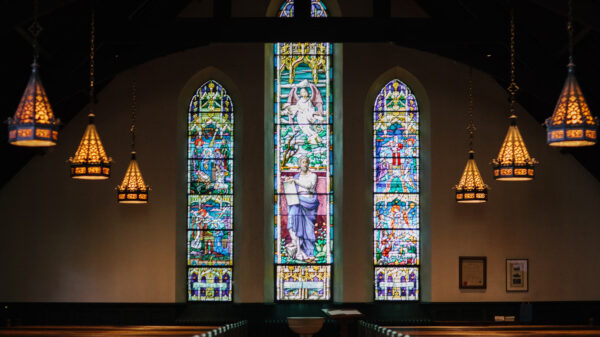
As an example, I’ve been in conversations with Mormons and have talked about the nature of grace and salvation. Maybe you’ve had similar conversations:
You: “As a Christian, I believe that we are saved by faith alone.”
Your Mormon Friend: “As a Mormon, I agree!”
You: “Huh?”
Your Mormon Friend: “Mormons know that ‘salvation’ as you put it, is a gift from God.”
You: “OK, but we believe that Jesus paid the penalty for our sin and that He alone saves us.”
Your Mormon Friend: “We agree! We believe that Jesus died for us and that without His gift of salvation, none of us would be ‘saved’ as you are calling it.
You: “OK, but Christians believe that Jesus’ work ALONE saves us; we don’t believe that our own efforts can save us at all.”
Your Mormon Friend: “We feel the same way! We know that Jesus alone makes it possible for us to be reunited with Heavenly Father; we don’t believe that ‘salvation’, can be achieved with our good works.”
Wow, it sure sounds like your Mormon friend holds a Christian view of salvation through faith alone, doesn’t it? I’ve had many conversations that are very similar to this one. The Mormon doctrine of salvation is NOT the same as the Christian doctrine, but unless you take the time to ask good questions and sift through the answers, you may not see the distinctions clearly.
What Do We Mean When We Use the Term, “Heaven”?
Let me try to describe the difference between “Christian grace” and “Mormon grace” with an illustration that I’ve used hundreds of times training Christians to discuss their faith with Mormons. Before we begin, however, we need to define a foundational term: “heaven”. Christians sometimes ask their Mormon friends, “If you died today, would you be in heaven?” or “What do you have to do to go to heaven?” Unless we define the term “heaven” this approach will not help us understand the differences between the two faith systems. I never use the term “heaven” when talking to my Mormon friends and family. Instead, I focus on “the greatest gift that God can offer us after death”. For Christians, this is, in fact, heaven; the realm of god we will share for all eternity. But the Mormon heaven is divided into three levels and virtually everyone is going to get into one of these levels. Any of these heavenly “ranks” could accurately be called “heaven”. So we need to be more specific with our Mormon friends; for them, the “the greatest gift that God can offer us after death” is not just “heaven”, it’s exaltation in Celestial Kingdom. This exaltation results in deity for the Mormon believer. They become Gods just like Heavenly Father.
Is Grace A Ladder or a Lifeline?
So, the real question is, “What must you do to be exalted in Celestial Kingdom with Heavenly Father?” Now, with this question clarified, we can talk about grace and the contribution that Jesus makes to this process. So, here is the illustration that I typically use: imagine that you are a Mormon who wants “the greatest gift that God can offer after death” (heaven). How can you achieve exaltation in Celestial Kingdom? For the Mormon, Jesus makes this journey possible because he visits us here on earth and, in essence, provides us with a ladder we can climb to heaven. This ladder is a free gift. It is given as an act of “grace” according to our Mormon friends. But here is the problem: the Mormon has to climb the ladder on his or her own. This climbing is done through a lifelong series of good works. Jesus may give you the ladder, but he doesn’t climb it for you.
This is an important distinction to understand. Mormons will tell us that they cannot get to “Celestial Kingdom” without the free gift offered by Jesus. That’s true. Without the free ladder, you can’t begin to climb. Mormons will also say that Jesus alone makes it possible for them to attain the “greatest gift that God offers us after death”. That’s true. Only Jesus has the ladder. Mormons will also say that they could never ascend to Celestial Kingdom on the basis of their own good works. That’s also true; “climbing” isn’t possible unless there’s a ladder to climb. Mormons can’t get to Celestial Kingdom with their own good works alone; they need that ladder.
So, What’s the Difference Between Mormon Grace and Christian Grace?
The Christian view of grace doesn’t involve a ladder of any kind; in Christian theology, Jesus doesn’t bring us a ladder to climb. Instead, Jesus drops us a lifeline, a rope He climbs down and ties to each of us. Jesus then pulls us up on his own, in spite of our own inability. It doesn’t matter how heavy we are or where we are in our journey toward sanctification. We simply have to trust him to tie the lifeline. Mormonism is a works based religion, like many other world religions. In fact, in this one regard, Mormonism is like every other world religion. Christianity stands alone as the only religion that offers true “grace” to its adherents. Salvation is not the result of anything we do. God offers it as a free gift; not a free opportunity to work hard for our salvation, but a truly free gift that needs no additional contribution on our part. This distinction is critical and it separates Mormonism from Christianity, not as a separate denomination, but as a completely separate notion about the nature and saving work of God.
Christianity stands alone as the only religion that offers true “grace” to its adherents. Salvation is not the result of anything we do. Share on X

J. Warner Wallace is a Dateline featured Cold-Case Detective, Senior Fellow at the Colson Center for Christian Worldview, Adj. Professor of Christian Apologetics at Talbot School of Theology, Biola University, author of Cold-Case Christianity, God’s Crime Scene, and Forensic Faith, and creator of the Case Makers Academy for kids.
Subscribe to J. Warner’s Daily Email
J. Warner Wallace is a Dateline featured cold-case homicide detective, popular national speaker and best-selling author. He continues to consult on cold-case investigations while serving as a Senior Fellow at the Colson Center for Christian Worldview. He is also an Adj. Professor of Christian Apologetics at Talbot School of Theology, Biola University, and a faculty member at Summit Ministries. He holds a BA in Design (from CSULB), an MA in Architecture (from UCLA), and an MA in Theological Studies (from Gateway Seminary).









































Pingback: Mormon Beliefs, Salvation and the Nature of Perfection | Cold Case Christianity
Pingback: The Simple Relationship Between Faith and Works | Cold Case Christianity
Pingback: The Salvation Equation: The Simple Relationship Between Faith and Works – J. Warner Wallace | Truth2Freedom's Blog
Pingback: Why Christians Know They Have Eternal Life (Right Now) | Cold Case Christianity
Pingback: Salvation: Why Christians Know They Have Eternal Life (Right Now) | TLG Christian News
Pingback: The Salvation Equation: The Simple Relationship Between Faith and Works | TLG Christian News
Steve Barcak
August 7, 2020 at 8:05 pm
good topic but, like most Christian writings on the Mormons, this one lacks any references from the Book of Mormon.
As a Christ believer/Christian I trust Holy scripture as God’s Word. In at least one of Paul’s epistles, I think Thes. There is mention of a ‘3rd Heaven’. Yet, this writing makes no mention of that.
There are other areas in Scripture, such as ‘Sons of God” in Genesis that seem to contradict that Jesus is the on and only son of God ( as I believe ).
Then whenever one of these writings/commentaries, there are Never any references in Morman writings to research and study to see if you are correct.
This lack of references effects me andothers when it is time to talk with LDS people about the truth.
The LDS people are a confident bunch, tight families, honor Sunday as day of rest better than us Christians do. They know how to handle their women, they know their gender roles and not ashamed to be a mom and homemaker , etc. Most Christ gals, are brought up to ut career first and kids second and husband/marriage 3rd. That is why there are so many ‘Christian’ single moms out there.
So, my ,02, when you wirte on a subject, do not be scared to use references so people reading can follow up and learn further about what you are writing about.
J. Warner
August 10, 2020 at 6:32 am
That’s because THIS article has a limited purpose. Here’s another with citations: https://coldcasechristianity.com/writings/is-mormon-salvation-possible/
Kathy Falk
October 7, 2020 at 5:55 pm
Thank you so much for this. I Googled “Mormons grace” and found this article. I have had almost word-for-word conversations like the one in your article. My husband and I have been meeting with 2 Mormon missionaries and an elder from the local Mormon church for about 10 visits, and we’ve been SO frustrated, because we explain the gospel of grace, and they agree with us! And yet we KNOW that Mormonism is a religion of works. Your article told us what we should have figured out on our own! We knew that they believe in different levels of heaven, and that even after death people can respond to Christ’s preaching to them (1 Peter 3) and be saved–but they would only be eligible for the lower realm of heaven. It’s the second and third levels which require works–and lots of them. I’m eager to read the other articles you have referenced above. We’re meeting with our Mormon friends again in two days, so what you have written will be so helpful to us.
Scott Hagen
October 18, 2020 at 5:04 pm
Thanks for your very helpful analogy. I am a Mormon and I think your analogy is pretty fair. Can I ask you a different question: Do you believe that Catholics are Christian? I am asking because I thought Catholics also believe that some “works” are required for salvation. In fact, I think that was the argument between Luther and Erasmus. Can you answer that question? Thanks!
Nick
March 4, 2021 at 10:42 am
Hey Scott – hopefully I can shed a bit of light on the question about Catholics being Christian. If we are talking about the Roman Catholic who affirms Roman Catholic doctrine/dogmas then no, we would not believe them to be Christians. This is because the Roman Catholic Church has anathematized the Gospel of eternal life being 100% Christ’s/God’s work. That said, there are a lot of lay people within that church who would not understand the deeper doctrines involved. So if the person who is apart of the Roman Catholic church believes we are justified by Christ/God’s grace alone (no personal works involved to contribute to eternal life) then yes they are a Christian – but they are a Christian in spite of what that church teaches, not because of its doctrines. Hope that helps a bit.
Tom Christenbury
July 10, 2023 at 9:25 am
A Catholic will readily admit that the seven sacraments are a “means of grace”. If the Episcopal church (including Anglicans and Methodists) believe in 2 sacraments (as they do), with them also in agreement that sacraments are a “Means of Grace”, then also- so what does this mean….? It means to me that Catholics and non-catholic Christians are in agreement that there is not a work requirement for salvation. There is however a faith requirement.
Rick Medrano
February 14, 2021 at 8:29 am
Mormons believe precious truths were lost in the translation of the Bible . However those truths have been restored and the Gospel is now preached as in the time of Christ. You either believe the gospel has been restored or not. If you don’t believe in the restoration, there is no point in trying to dissect Mormon doctrine. You will never understand it. If you believe that the Gospel was restored, then you believe Joseph Smith is a prophet of God and that through him God clarified what Grace is
I enjoyed reading your article. Very respectful article! I would recommend you read the Book of Mormon, if you have not done so. I can’t talk about other religions if I have not read and study their beliefs. You have done research and is evident. People usually regurgitate what others say. I read the Book of Mormon and believe that the Gospel has been restored.
Jake Emlich
August 3, 2022 at 1:44 pm
Hi Rick, it does come down to whether you believe Joseph Smith was a true prophet or not. However, many Mormons still consider themselves as Christians. The fact is, the gospel from Joseph Smith is a fundamentally different gospel than what Christians believe and many Mormons don’t know that. The Mormons I talk to believe LDS is a denomination of Christianity, but there are actually deep core differences.